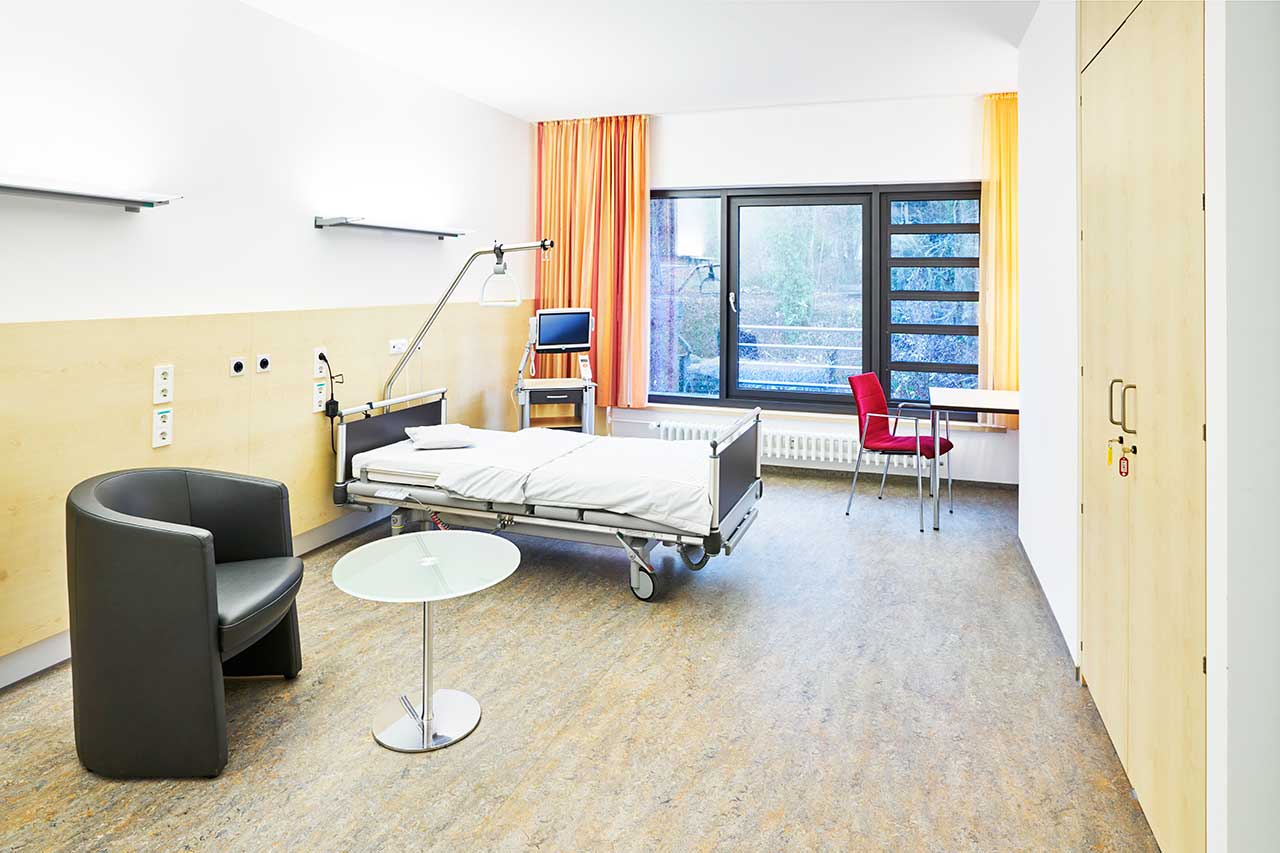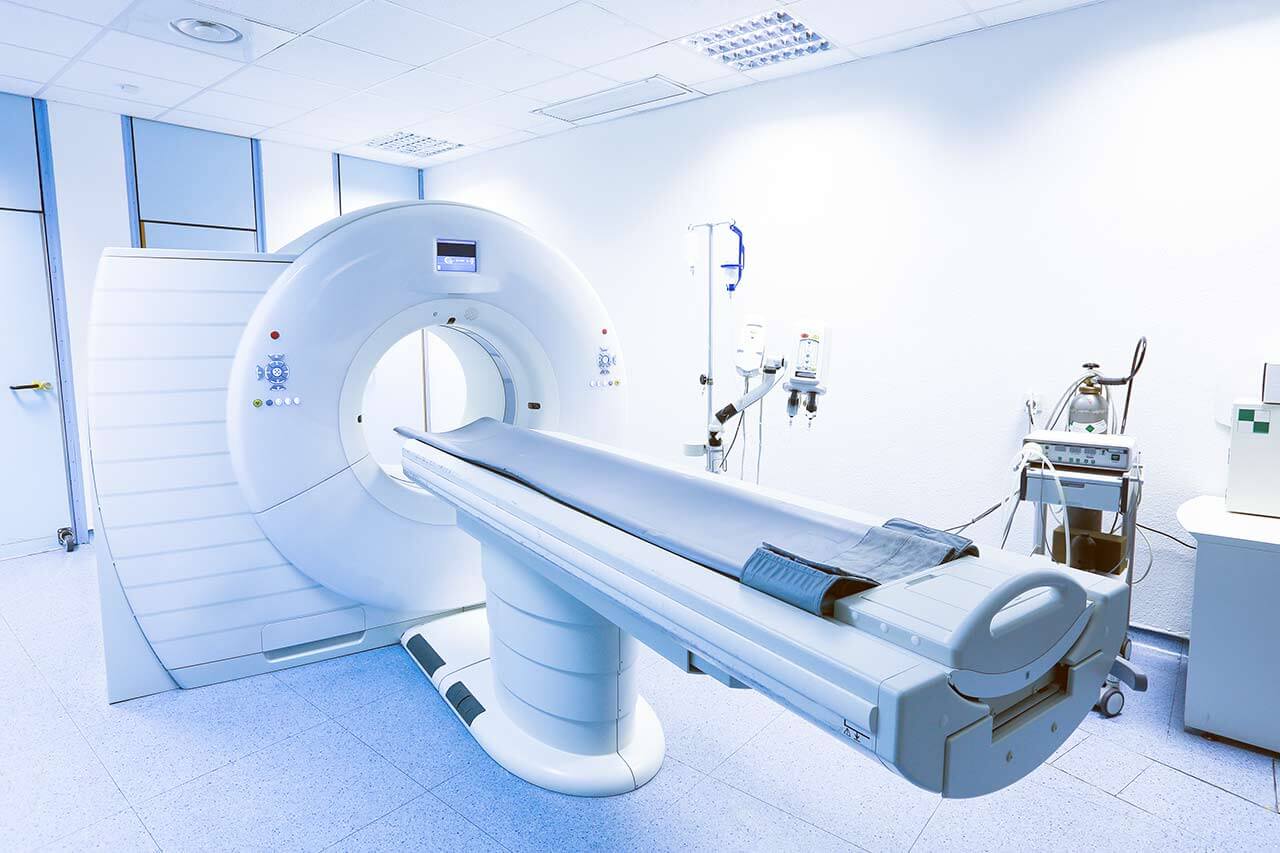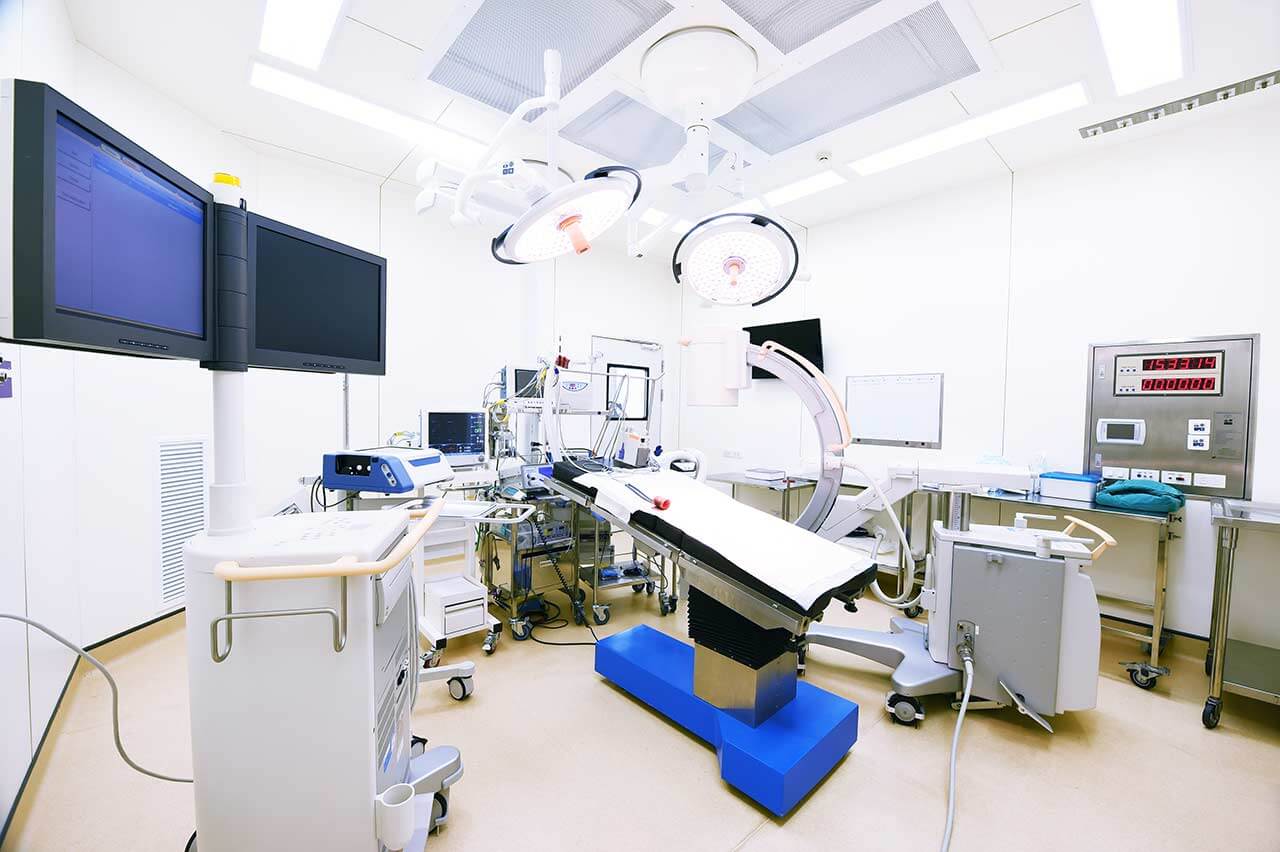
The program includes:
- Initial presentation in the clinic
- clinical history taking
- physical examination
- laboratory tests:
- complete blood count
- general urine analysis
- biochemical blood test
- tumor markers (CEA, CA19-9, AFP)
- inflammation markers (CRP, ESR)
- blood coagulation analysis (aPTT, PT, INR)
- ultrasound of the abomen
- CT of the abomen
- FNA liver biopsy under CT control (if clinically indicated, additional cost is 3500€)
- nursing services
- services of all leading experts
- explanation of individual treatment plan
Required documents
- Medical records
- Abdominal ultrasound (if available)
- MRI/CT scan of the abdomen and pelvis (if available)
Service
You may also book:
 BookingHealth Price from:
BookingHealth Price from:
About the department
According to the Focus magazine, the Department of General, Abdominal, Endocrine, Colorectal and Bariatric Surgery at the University Hospital Erlangen ranks among the top German departments specializing in colon cancer treatment!
The department offers the full range of modern surgical interventions. The priority field of clinical activity is cancer surgery, in particular, sparing minimally invasive procedures and robot-assisted interventions. Each patient receives an individual therapy regimen, which is discussed at daily medical boards with doctors from other medical fields. In addition, the responsibility of the medical facility includes surgeries for endocrine disorders and bariatric interventions for morbid obesity. The team of the department's surgeons has a wealth of experience in classical open and minimally invasive procedures on the abdominal organs, as well as specializes in the innovative da Vinci robot-assisted surgery. The department also successfully performs cytoreductive interventions. The department is headed by Prof. Dr. med. Robert Grützmann.
The key component of the department's successful clinical activity is state-of-the-art medical equipment, which allows performing sparing interventions and ensures maximum safety for patients. With appropriate clinical indications, surgeons prefer minimally invasive and robot-assisted (da Vinci surgical system) interventions. Thus, the patient receives effective treatment with a low risk of postoperative complications, a short hospital stay and minimal pain.
The department's primary focus is cancer surgery. The department's competent surgeons specialize in surgical procedures for resection of tumors of the esophagus, stomach, pancreas, liver, thyroid gland, parathyroid glands, rectum and other parts of the colon, malignant melanomas, soft tissue tumors, adrenal tumors and metastases in various organs. The medical facility also provides medical care for patients with peritoneal carcinomatosis. A modern procedure of hyperthermic intraperitoneal chemotherapy (HIPEC) demonstrates high efficiency in such patients. The essence of the therapeutic manipulation is to flush the abdominal cavity with a hot solution of high concentration chemotherapy drugs. The dose of drugs administered during the HIPEC procedure is tens of times higher than during conventional systemic chemotherapy. Chemotherapy drugs heated up to +42°C are injected into the abdominal cavity after surgical removal of malignant neoplasms. Thus, HIPEC is successfully used in the fight against metastatic cancer of the abdominal cavity. The patients get a chance for a complete cure or long-term remission. In addition, patients with colorectal cancer are offered modern cytoreductive interventions that ensure maximum removal of malignant tissues.
Of particular interest to the department's specialists is the treatment of colon diseases, including the rectum and anus. These include benign and malignant pathologies, inflammatory processes and functional disorders. The department is most often visited by the patients with anal fistulas and abscesses, pilonidal sinus, hemorrhoidal pathologies, fecal incontinence, chronic constipation, Crohn's disease and ulcerative colitis. Whenever possible, doctors try to solve the problem with conservative methods, and the specialists from related medical fields often participate in the medical board. The team of specialists in colorectal surgery has vast experience in stoma formation and caring for such patients.
In the field of endocrine surgery, surgeons perform operations for the treatment of benign and malignant diseases of the thyroid gland, parathyroid glands, adrenal glands and pancreas. Sparing endoscopic techniques are preferred, if possible. Thyroid diseases are often treated in collaboration with specialists in nuclear medicine (radioiodine therapy).
The team of the department's surgeons successfully performs bariatric interventions in patients suffering from morbid obesity. Such interventions are indicated for patients with a body mass index of 40 kg/m2 and above. In other cases, weight loss is achieved through diet therapy, physical exercises and behavioral therapy. The operation allows the doctors not only to effectively eliminate excess body weight, but also to improve the health of patients with type 2 diabetes mellitus, cardiovascular diseases, lipid metabolism disorders and other pathologies. Prior to the surgical intervention, doctors conduct comprehensive diagnostics, which helps to assess the availability of indications for surgical treatment and to exclude surgical risks. After the examination, the department's bariatric surgeons determine which type of intervention will be most effective. This can be an intragastric balloon implantation, gastric banding, sleeve gastroplasty, gastric bypass surgery and others. The treatment mostly involves the use of sparing laparoscopic techniques. After bariatric procedures, aesthetic plastic surgery is often performed to remove excess (stretched) skin. The consolidation of the results of the operation requires individual diet therapy and physical activity. Behavioral therapy (psychotherapy) is also part of the clinical protocol.
Other fields of the department's specialization include the surgical treatment of diseases of the gastrointestinal tract, including the liver, treatment of soft tissue (sarcoma) and skin tumors (for example, malignant melanoma), removal of hernias, treatment of gastroesophageal reflux disease, as well as conservative and surgical treatment of infectious lesions of the skin and soft tissues.
The department's key clinical focuses include:
- General and abdominal surgery
- Cancer surgery
- Surgery for esophageal, stomach, pancreatic, liver, thyroid, parathyroid tumors
- Surgery for colon tumors, including the rectum
- Surgery for malignant melanoma, soft tissue tumors
- Surgery for adrenal tumors
- Surgery for peritoneal carcinomatosis (hyperthermic intraperitoneal chemotherapy – HIPEC)
- Surgery for metastases
- Surgery for benign diseases of the gallbladder and biliary tract
- Surgery for hernia repair
- Surgery for benign esophageal diseases
- Surgery for benign stomach diseases
- Surgery for benign pancreatic diseases
- Surgery for benign duodenal diseases
- Surgery for benign small intestine diseases
- Surgery for benign diseases of the colon, including the rectum and anus
- Cancer surgery
- Endocrine surgery
- Surgery for thyroid diseases
- Surgery for parathyroid diseases
- Surgery for adrenal diseases
- Surgery for pancreatic diseases
- Bariatric surgery (obesity treatment)
- Intragastric balloon implantation
- Gastric banding
- Sleeve gastrectomy
- Gastric bypass surgery
- Minimally invasive surgery and robot-assisted surgery with the innovative da Vinci surgical system
- Surgery for gallbladder diseases
- Surgery for stomach diseases, including morbid obesity and gastroesophageal reflux disease
- Surgery for adrenal diseases
- Surgery for diseases of the small and large intestine, including the rectum
- Surgery for spleen diseases
- Surgery for pancreatic diseases
- Surgery for liver diseases
- Surgical treatment of hyperhidrosis
- Transplant surgery (in cooperation with the specialized Transplant Center)
- Liver transplantation
- Pancreas transplantation
- Outpatient surgery
- Hernia repair surgery
- Colorectal interventions
- Implantation of port systems
- Resection of skin tumors and superficial soft tissue neoplasms
- Other interventions under local or general anesthesia
- Other medical services
Curriculum vitae
Higher Education
- 1990 - 1997 Study of Human Medicine at the Faculty of Medicine at the Free University of Berlin.
- 1997 Doctoral thesis defense. Subject: "Interaction of cholecystokinin and glutamate in neurons of the lateral geniculate body and rat hippocampus".
- 2005 Habilitation. Subject: "Molecular biological characterization and validation of oncogenes in sporadic and hereditary pancreatic carcinoma".
- Master of Business Administration.
Professional Medical Training
- Board certification in Surgery.
- Specialization in Abdominal Surgery.
- Additional qualification in Special Abdominal Surgery, Sports Medicine.
Professional Career
- 2007 to 2015 Work at the Mayo Clinic in Rochester, USA.
- 2012 Senior Physician in the Department of Abdominal, Thoracic and Vascular Surgery at the University Hospital Carl Gustav Carus Dresden.
- 2013 Deputy Head of the Center for Vascular Surgery at the University Hospital Carl Gustav Carus Dresden.
- 2014 Head of the Pancreatic Cancer Center at the University Hospital Carl Gustav Carus Dresden.
- Since October 1, 2015 Chief Physician in the Department of General, Abdominal, Endocrine, Colorectal and Bariatric Surgery at the University Hospital Erlangen.
Main Clinical Focuses
- Cancer surgery.
- Vascular surgery.
- General surgery.
- Pancreatic surgery.
Main Research Focuses
- Pancreatic cancer.
- Neoadjuvant therapy for pancreatic cancer.
- Cystic pancreatic tumors.
- Colorectal cancer.
Membership in Professional Societies
- Working Group on Hepatobiliary Surgery (CALGP).
- German Society of General and Abdominal Surgery (DGAV).
- German Society of Surgery (DGCH).
- German Society for Vascular Surgery and Vascular Medicine (DGG).
Scientific Awards and Prizes
- 2007 Scholarship (abroad) of the German Society of Surgery (Pancreas Centers in the United States and the American Congress of Surgeons).
- 2004 Report Award, Days of Surgical Studies in Mannheim.
- 2004 Carl Gustav Carus Award.
- 2004 Dr. Walter Seipp Prize, Commerzbank-Stiftung Foundation.
- 2005 von Langenbeck Prize of the German Society of Surgery.
- 2005 Educational Award of the Medical Faculty of the Technical University of Dresden.
- 2013 Edgar Ungeheuer Prize of the German Society of Surgery for the Best Video Work.
Photo of the doctor: (c) Universitätsklinikum Erlangen
About hospital
According to the Focus magazine, University Hospital Erlangen ranks among the best medical facilities in Germany!
The hospital is one of the leading healthcare facilities in Bavaria and offers top-class medical care distinguished by the close intertwining of clinical activities with research and training of medical students. The hospital was founded in 1815 and today is proud of its rich traditions, numerous medical achievements and an excellent reputation not only in Germany, but also in the international arena. The hospital has 25 specialized departments, 7 institutes and 41 interdisciplinary centers, whose experts work tirelessly for the benefit of their patients.
The hospital has the status of a maximum care center, and therefore it represents almost all fields of modern medicine. Oncology, transplant medicine, and robot-assisted surgery are among the top priorities of the clinical activities of the medical complex. Oncology is represented by the Comprehensive Cancer Center Erlangen, which is one of 13 centers of excellence in Germany certified by the German Cancer Society. The university hospital has a high-tech center with high success rates for heart, liver, kidney, pancreas, cornea and bone marrow transplants. In addition, the hospital is a leader in the use of robot-assisted surgery. The medical facility has at its disposal innovative robotic technologies, in particular the da Vinci Surgical System, with the help of which surgeons perform many sparing interventions in various medical fields.
The medical team of the hospital consists of highly professional therapists, surgeons and nursing staff. The focus of their efforts is on the patient, his health and peace of mind, as well as comfort during treatment. The clinical practice of doctors is based on an individual approach to each case, which results in high treatment success rates. State-of-the-art technical equipment also plays an important role in the therapeutic process. The hospital is proud of the most advanced devices for imaging diagnostics (X-ray, ultrasound, CT, MRI, PET-CT, SPECT-CT, etc.), endoscopic examinations, laboratory tests, as well as specially equipped operating rooms for robot-assisted interventions, image-guided therapeutic manipulations, minimally invasive and classical surgeries of any complexity. Thus, the doctors of the university hospital have all the necessary resources to effectively treat the most severe pathologies and save lives.
The combination of high-tech equipment, experienced and highly qualified personnel, as well as strict adherence to the standards of modern medicine, form a solid foundation for the provision of the best medical care at the European level. An undeniable proof of the high prestige of the hospital is the constantly growing number of patients who come here from various regions of Germany and other countries of the world.
Photo: (с) depositphotos
Accommodation in hospital
Patients rooms
The patients of the University Hospital Erlangen live in comfortable rooms with light colors and modern design. Each patient room has an ensuite bathroom with shower and toilet. The furnishing of the patient room includes an automatically adjustable bed with an orthopedic mattress, a bedside table, a wardrobe, a table and chairs for receiving visitors, a TV, a radio and a telephone. Wi-Fi can be provided upon request. The use of a mobile phone is prohibited in many rooms of the hospital.
Patients can also live in enhanced-comfort rooms with a more sophisticated design. The enhanced-comfort rooms additionally include upholstered furniture, a minifridge and a safe.
Meals and Menus
The hospital offers healthy and tasty food distinguished by many awards, including the 1st place in the prestigious ESSEN PRO GESUNDHEIT competition of the Bavarian State Ministry of the Environment and Consumer Protection.
The patient and the accompanying person have three meals a day. Breakfast is served buffet style: scrambled eggs, boiled eggs, sausage, cheese, bread and buns with butter and jam, cereals, etc. There are three set menus for lunch and dinner to choose from: a classic menu featuring local cuisine dishes, a Mediterranean menu and a vegetarian menu.
If for some reason you do not eat all the foods, you will be offered an individual menu. Please inform the medical staff about your dietary preferences prior to the treatment.
The hospital also houses many cafeterias, which will delight with a wide range of delicious dishes and drinks.
Further details
Standard rooms include:
Religion
The hospital regularly hosts catholic and evangelical devine services. The services of representatives of other religions are available upon request.
Accompanying person
During an inpatient program, an accompanying person can stay with you in the patient room or in a hotel of your choice.
Hotel
During an outpatient program, you can stay in a hotel of your choice. The managers will help you choose the most suitable options.




